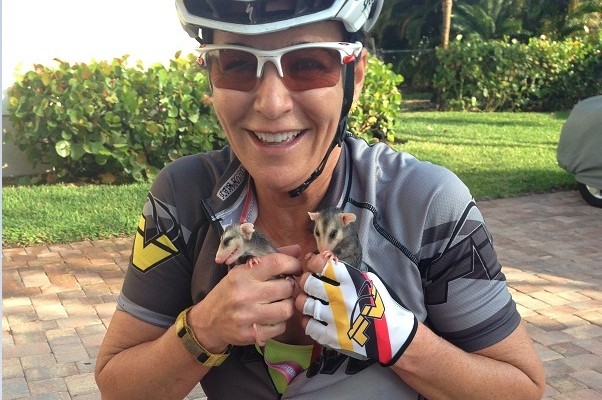Naples woman brings little critters on board her bicycle and saves their lives.
Tish Kelly was just riding home after Monday morning’s Naples Velo ride when a recently killed opossum caught her eye. “I have always check road kill to see if they are really dead or if there are any sign of babies about,” says Kelly, who volunteered for many years at the Nature Conservancy’s wildlife clinic.
“I turned around and pulled the thing off the road and checked its pouch.” Inside she found two little baby opossums still trying to suckle from their dead mother’s nipple. “I pulled them out and they were very alive and unhappy! I took a few pics for proof to show my naysayer bike friends and put them in the only place I had, down my sports bra. [It] turned out to be the perfect spot. They moved around then settled in and fell asleep; I rode the rest of the way home,” says Kelly. “No way would they have survived if I hadn’t. They were too young and they would have died for sure from starvation or being run over again. The vultures were already on the scene.”
Kelly says in the past, her group of riding partners would make fun of her for checking out the road kill. Now they get it. “It grosses my husband Chuck out, but even he admitted it was a good thing and [that] the little ones were cute!” she says. While opossums can carry rabies, Kelly says she’s never worried about it because in all her work transporting adult opossums for the wildlife clinic she never came across a rabid animal. Indeed, the Humane Society of the United States says that opossums are “amazingly resistant to rabies. Hissing, drooling, and swaying are part of the opossum’s bluff routine.” These behaviors make opossums appear rabid for protection, even though they rarely get or carry the disease.
Of course, you should always use care when handling wildlife, but this time of year—which is baby season for many creatures—it’s a good idea to give newly killed road the once-over. And if you’re not up for the task, Kelly says she’ll do it. “They can call me! Or they can always call the Conservancy, they will come and fetch it.” If you find an injured animal call the Nature Conservancy’s wildlife clinic at 239-262-CARE.

